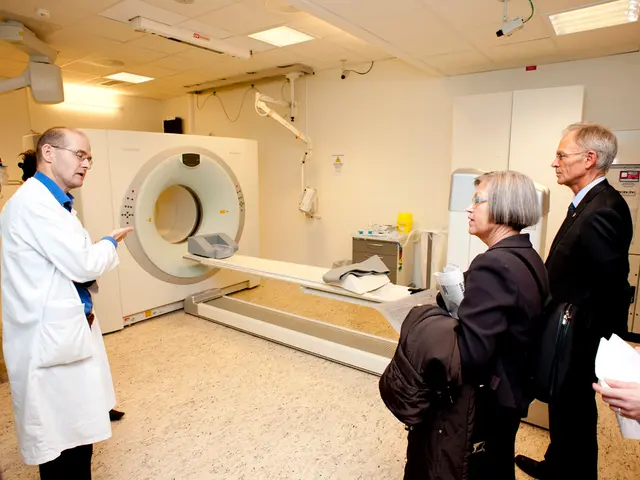Engineered organ transplants appearing imminent in the medical field?
A Peek into the Future of Gut Replacement: Tissue-Engineered Solutions on the Horizon
Say goodbye to the traditional treatment methods for severe gastrointestinal problems – engineers are working round the clock to revolutionize these antiquated practices with lab-grown organs. But what lies ahead in this promising field of regenerative medicine?
Take a look at the tireless efforts of the brilliant minds at Wake Forest Institute for Regenerative Medicine (WFIRM), who've been cracking codes to create tissue-engineered wonders for decades. Today, we're taking a closer look at the latest advancements in tissue engineering aimed at addressing two significant challenges: short bowel syndrome and anal sphincter injuries.
The Race To Regenerate: Short Bowel Syndrome
Dr. Khalil N. Bitar and his team at WFIRM aim to utilize patients' own cells to grow replacement tissue in the lab for devastating gastrointestinal conditions. Short bowel syndrome is one such condition that affects around 25 in every 100,000 newborns in the United States, leaving them with lifelong complications.
Dr. Bitar's group has perfected the art of growing muscle cells that align precisely in one direction and connect with nerve cells, thanks to a painstaking method developed over the years. By weaving these two key components together, they've managed to create tiny tubes that mimic the structure of the small intestine. After 4 weeks of incubation in rats, these tubes showed signs of digestion and nutrient uptake – a promising step towards a future where lab-grown intestines could be a viable solution for patients in dire need.
Time To Repair: Anal Sphincter Injuries
Damage to the anal sphincter, often due to childbirth or cancer surgery, can lead to serious complications such as fecal incontinence. In a bid to tackle this issue, Dr. Bitar's team has been working on an engineered anal sphincter for over a decade. Their latest publication in Stem Cells Translational Medicine demonstrates the feasibility of this approach, which has been tested in large animal models and shows significant promise.
While the road ahead is a long one, with longer follow-up studies currently underway, the progress made in tissue engineering at WFIRM is undeniable. As Dr. Bitar puts it, the primary challenge lies in "getting all of the cell types working together in a coordinated fashion, followed by scaling the tissue-engineered intestine to a clinically useful dimension."
On a broader scale, tissue engineering is not the sole domain of WFIRM. Other pioneering researchers – such as Dr. Tracy Grikscheit, Dr. James Dunn, and Dr. Levilester Salcedo – are also making strides in the field, working together to bring hope to millions suffering from gastrointestinal troubles.
The path to widespread clinical application of tissue-engineered solutions might be arduous, but perseverance is key. As funding for scientific research remains in the balance, it's essential to remember that the efforts of pioneering scientists, like those at WFIRM, pave the way for life-changing medical breakthroughs – just a few years away.
Enrichment Data:
Overall:
The Wake Forest Institute for Regenerative Medicine (WFIRM): A Leader in Tissue Engineering
Since its establishment, WFIRM has garnered a reputation for cutting-edge research in tissue engineering, regenerative medicine, and organ bioprinting. Some key features of the institute include:
- Global Partnerships: WFIRM collaborates with over 400 entities worldwide, fostering global collaborations that could accelerate research progress.
- Expertise Across Multiple Areas: The institute's research spans tissue engineering, cell therapies, and diagnostics, all crucial for the development of innovative solutions for complex conditions like gastrointestinal disorders.
Specific Advancements for Short Bowel Syndrome and Anal Sphincter Injuries
While specific projects focused on short bowel syndrome and anal sphincter injuries by WFIRM are not explicitly mentioned, the institute's advancements in tissue engineering and organ bioprinting suggest potential for addressing these conditions. For instance:
- Intestine Tissue Replacement: WFIRM's expertise in engineering hollow organs suggests potential for developing tissue-engineered solutions for short bowel syndrome – a condition that involves the loss of intestinal tissue.
- Muscle and Tissue Repair: The institute's ability to engineer a wide range of tissues could potentially extend to repairing or replacing damaged muscle tissues involved in anal sphincter injuries.
Future Prospects
Given the limited information available on specific projects geared towards these conditions, a precise timeline for their development by WFIRM cannot be provided. However, the institute's ongoing research and advancements in tissue engineering position it well to contribute to solutions in these areas, but further updates would be needed to confirm specific progress or timelines.
- The groundbreaking research at Wake Forest Institute for Regenerative Medicine (WFIRM) in the field of tissue engineering will not only revolutionize the treatment of short bowel syndrome but also address other medical conditions, including bowel incontinence.
- In the realm of health and wellness, WFIRM's tireless pursuit of regenerative medicine involves creating tissue-engineered solutions, such as lab-grown intestines, for patients facing severe gastrointestinal conditions like short bowel syndrome.
- Besides short bowel syndrome, WFIRM's innovative therapies and treatments are geared towards repairing damage to the anal sphincter, often caused by childbirth or cancer surgery, to improve patient care and alleviate complications such as fecal incontinence.








